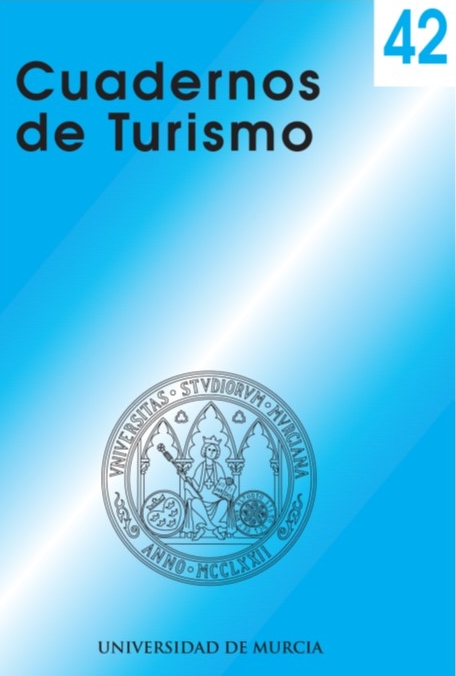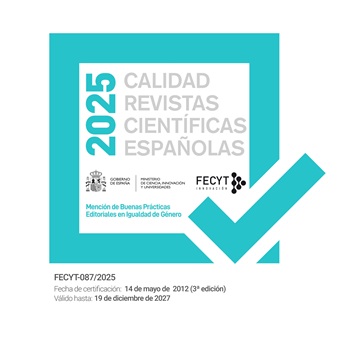Searching and sharing of information in social networks during the different stages of a trip
Abstract
There are three phases in the use of online social media by tourists: before, during and after the trip. The aim of this study is to determine what social network users use to find information before and during the trip, the type of information they search, and where they share information. The study also identifies the relationship this has with the trustworthiness social networks provide them, especially distinguishing the social networks managed by the destination organizations. Therefore, we conduct a survey of 800 tourists who are social network users. Results show that social networks are not a major source of information before or during the trip but are very important for sharing contents after the experience, and that the most searched information concerns the main attractions of the destination. Moreover, there is a relationship between the use of social media and their perceived trustworthiness. In this case, for those who use social networks managed by destinations, these give them greater confidence.
Downloads
-
Abstract1131
-
PDF1240
-
PDF (Español (España))1240
References
AYEH, J. K., AU, N. and LAW, R. (2013): «Do we believe in TripAdvisor?” Examining credibility perceptions and online travelers’ attitude toward using user-generated content», Journal of Travel Research, vol. 52 (4), pp. 437-452.
AYEH, J. K., NORMAN, A. and LAW, R. (2013): «Predicting the intention to use consumer-generated media for travel planning», Tourism Management, vol. 35, pp. 132-143.
BJÖRK, P. and KAUPPINEN-RÄISÄNEN, H. (2015): «Contemporary insights to the dynamic pre-trip information sourcing behaviour», Tourism and Hospitality Research, vol. 15 (1), pp. 39-53.
BUHALIS, D. and LAW, R. (2008): «Progress in information technology and tourism management: 20 years on and 10 years after the Internet-The state of eTourism research», Tourism Management, vol. 29 (4), pp. 609–623.
CASALÓ, L. V., FLAVIÁN, C., GUINALÍU, M. and EKINCI, Y. (2015): «Do online hotel rating schemes influence booking behaviors? », International Journal of Hospitality Management, vol. 49, pp. 28-36.
CHOE, Y., KIM, J. and FESENMAIER, D. R. (2017): «Use of social media across the trip experience: An application of latent transition analysis», Journal of Travel & Tourism Marketing, vol. 34 (4), pp. 431-443.
CHOI, S., LEHTO, X. Y., MORRISON, A. M. and JANG, S. (2012): «Structure of travel planning processes and information use patterns», Journal of Travel Research, vol. 51 (1), pp. 26-40.
COX, C., BURGESS, S., SELLITTO, C. and BUULTJENS, J. (2009): «The role of user-generated content in tourists’ travel planning behavior», Journal of Hospitality Marketing & Management, vol. 18 (8), pp. 743-764.
EUROBAROMETER (2016): Flash Eurobarometer 432: Preferences of Europeans towards tourism. Brussels, Belgium.
FLATT, M. (2010): «Trust agents: Using the web to build influence, improve reputation, and earn trust - Chris Brogan and Julien Smith», International Journal of Advertising, vol. 29.
FOTIS, J., BUHALIS, D. and ROSSIDES, N. (2011): «Social media impact on holiday travel planning», International Journal of Online Marketing, vol. 1 (4), pp. 1-19.
GARTNER, W. C. (1993): «Image formation process», Journal of Travel & Tourism Marketing, vol. 2 (2–3), pp. 191-215.
GRETZEL, U. and YOO, K.-H. (2013): «Premises and promises of social media marketing in tourism», in The Routledge handbook of tourism marketing, pp. 491-504.
GURSOY, D. and McCLEARY, K.W. (2004): «An integrative model of tourists’ information search behavior», Annals of Tourism Research, vol. 31(2), pp. 353-373.
HENSEL, K. and DEIS, M. H. (2010): «Using social media to increase advertising and improve marketing», Entrepreneurial Executive, vol. 15, pp. 87-98.
HJALAGER, A.-M. and JENSEN, J.M. (2012): «A typology of travellers based on their propensity to go online before, during and after the trip», Information and Communication Technologies in Tourism, pp. 96-107.
HO, C.I., LIN, M.H. and CHEN, H.M. (2012): «Web users’ behavioural patterns of tourism information search: From online to offline», Tourism Management, vol. 33 (6), pp. 1468-1482.
HUANG, C. Y., CHOU, C. J. and LIN, P. C. (2010): «Involvement theory in constructing bloggers’ intention to purchase travel products», Tourism Management, vol. 31 (4), pp. 513-526.
HUDSON, S. and THAT, K. (2013): «The impact of social media on the consumer decision process: Implications for tourism marketing», Journal of Travel & Tourism Marketing, vol. 30 (1–2), pp. 156-160.
HUERTAS, A. and MARINE-ROIG, E. (2014): «Uso y utilidades de las herramientas de análisis online para la evaluación de la comunicación de las marcas de destino a través de los social media», Sphera Publica, nº especial: Las relaciones públicas para el cambio social, pp. 117-134.
HUERTAS, A. and MARINE-ROIG, E. (2016): «User reactions to destination brand contents in social media». Information Technology & Tourism, vol. 15 (4), pp. 291-315.
HUR, K., Kim, T. T., KARATEPE, O. M. and LEE, G. (2017): «An exploration of the factors influencing social media continuance usage and information sharing intentions among Korean travellers», Tourism Management, vol. 63, pp. 170-178.
HYDE, K. F. (2008): «Information processing and touring planning theory», Annals of Tourism Research, vol. 35 (3), pp. 712-731.
IP,C., LEE,H. and LAW, R. (2012): «Profiling the users of travel websites for planning and online experience sharing», Journal of Hospitality & Tourism Research, vol. 36 (3), pp. 418-426.
JACOBSEN, J.K.S. and MUNAR, A.M. (2012): «Tourist information search and destination choice in a digital age», Tourism Management Perspectives, vol. 1(1), pp. 39-47.
JUN, S. H. and HOLLAND, S. (2012): «Information-processing strategies: A focus on pictorial information roles», Journal of Travel Research, vol. 51 (2), pp. 205-218.
KANG, M. and SCHUETT, M.A. (2013): «Determinants of sharing travel experiences in social media», Journal of Travel & Tourism Marketing, vol. 30 (1–2), pp. 93-107.
KIM, M.-J., CHUNG, N. and LEE, C.-K. (2011): «The effect of perceived trust on electronic commerce: Shopping online for tourism products and services in South Korea», Tourism Management, vol. 32, pp. 256-265.
KIM, J. and FESENMAIER, D.R. (2017): «Sharing tourism experiences: The posttrip experience», Journal of Travel Research, vol. 56 (1), pp. 28-40.
LADHARI, R. and MICHAUD, M. (2015): «EWOM effects on hotel booking intentions, attitudes, trust, and website perceptions», International Journal of Hospitality Management, vol. 46, pp. 36-45.
LEUNG, D., LAW, R., VAN HOOF, H. and BUHALIS, D. (2013): «Social media in tourism and hospitality: A literature review», Journal of Travel & Tourism Marketing, vol. 30 (1–2), pp. 3-22.
LIM, Y., CHUNG, Y. and WEAVER, P.A. (2012): «The impact of social media on destination branding: Consumer-generated videos versus destination marketer-generated videos», Journal of Vacation Marketing, vol. 18 (3), pp. 197-206.
LIU, Q., KARAHANNA, E. and WATSON, R.T. (2011): «Unveiling user-generated content: Designing websites to best present customer reviews», Business Horizons, vol. 54 (3), pp. 231-240.
LLODRÀ-RIERA, I., MARTÍNEZ-RUIZ, M. P., JIMÉNEZ-ZARCO, A. I. and IZQUIERDO-YUSTA, A. (2015): «A multidimensional analysis of the information sources construct and its relevance for destination image formation», Tourism Management, vol. 48, pp. 319-328.
MARINE-ROIG, E. (2017): «Measuring destination image through travel reviews in search engines», Sustainability, vol. 9 (8), pp. 1-18.
MARINE-ROIG, E. and ANTON CLAVÉ, S. (2015): «Tourism analytics with massive user-generated content: A case study of Barcelona», Journal of Destination Marketing & Management, vol. 4 (3), pp. 162-172.
MARINE-ROIG, E., MARTIN-FUENTES, E. and DARIES-RAMON, N. (2017): «User-generated social media events in tourism», Sustainability, vol. 9 (12), pp. 1-23.
MUNAR, A.M. and JACOBSEN, J.K.S. (2013): «Trust and involvement in tourism social media and web-based travel information sources», Scandinavian Journal of Hospitality and Tourism, vol. 13 (1), pp. 1-19.
ÖZ, M. (2015): «Social media utilization of tourists for travel-related purposes», International Journal of Contemporary Hospitality Management, vol. 27 (5), pp. 1003-1023.
PABEL, A. and PRIDEAUX, B. (2016): «Social media use in pre-trip planning by tourists visiting a small regional leisure destination», Journal of Vacation Marketing, vol. 22 (4), pp. 335-348.
PARRA-LÓPEZ, E., BULCHAND-GIDUMAL, J., GUTIÉRREZ-TAÑO, D. and DÍAZ-ARMAS, R. (2011): «Intentions to use social media in organizing and taking vacation trips», Computers in Human Behavior, vol. 27 (2), pp. 640-654.
PIROLLI, B. (2018): «Travel information online: navigating correspondents, consensus, and conversation», Current Issues in Tourism, vol. 21 (12), pp. 1.337-1.343.
PREBENSEN, N., SKALLERUD, K. and CHEN, J. S. (2010): «Tourist motivation with sun and sand destinations: Satisfaction and the WOM-effect», Journal of Travel & Tourism Marketing, vol. 27 (8), pp. 858-873.
RUZIC, D. and BILOS, A. (2010): «Social media in destination marketing organisations (DMOs)», Tourism & Hospitality Management 2010, Conference Proceedings, (May 2010), pp. 178-190.
SEABRA, C., ABRANTES, JL. and LAGES, L.F. (2007): «The impact of using non-media information sources on the future use of mass media information sources : The mediating role of expectations fulfillment»,Tourism Management, vol. 28 (6), pp. 1.541-1.554.
SHAO, G. (2009): «Understanding the appeal of user-generated media: a uses and gratification perspective», Internet Research, vol. 19 (1), pp. 7-25.
SIGALA, M., CHRISTOU, E. and GRETZEL, U. (2012): Social media in travel, tourism and hospitality: Theory, practice and cases. In M. Sigala, E. Christou and U. Gretzel, (Eds.). Surrey, England: Ashgate Publishing.
SOTIRIADIS, M. D. (2017): «Sharing tourism experiences in social media», International Journal of Contemporary Hospitality Management, vol. 29 (1), pp. 179-225.
XIANG, Z. and GRETZEL, U. (2010): «Role of social media in online travel information search», Tourism Management, vol. 31 (2), pp. 179-188.
XIANG, Z., MAGNINI, V.P. and FESENMAIER, D.R. (2015): «Information technology and consumer behavior in travel and tourism: Insights from travel planning using the internet», Journal of Retailing and Consumer Services, vol. 22, pp. 244-249.
XIANG, Z., WANG, D., O’LEARY, J. T. and FESENMAIER, D. R. (2015): «Adapting to the Internet: Trends in travelers’ use of the Web for trip planning», Journal of Travel Research, vol. 54 (4), pp. 511-527.
XIANG, Z., WOBER, K. and FESENMAIER, D.R. (2008): «Representation of the online tourism domain in search engines», Journal of Travel Research, vol. 47 (2), pp. 137-150.
YOO, K.-H. and GRETZEL, U. (2012): Use and creation of social media by travellers. In M. Sigala, E. Christou and U. Gretzel (Eds.), Social Media in Travel, Tourism and Hospitality: Theory, Practice and Cases (pp. 189-205). Surrey, UK: Ashgate Publishing.
YOO, K. H., LEE, K.S. and GRETZEL, U. (2007): The role of source characteristics in eWOM : What makes online travel reviewers credible and likeable ? The 14th International ENTER Conference, pp. 22-34.
Las obras que se publican en esta revista están sujetas a los siguientes términos:
1. El Servicio de Publicaciones de la Universidad de Murcia (la editorial) conserva los derechos patrimoniales (copyright) de las obras publicadas, y favorece y permite la reutilización de las mismas bajo la licencia de uso indicada en el punto 2.
2. Las obras se publican en la edición electrónica de la revista bajo una licencia Creative Commons Reconocimiento-NoComercial-SinObraDerivada 3.0 España (texto legal). Se pueden copiar, usar, difundir, transmitir y exponer públicamente, siempre que: i) se cite la autoría y la fuente original de su publicación (revista, editorial y URL de la obra); ii) no se usen para fines comerciales; iii) se mencione la existencia y especificaciones de esta licencia de uso.
3. Condiciones de auto-archivo. Se permite y se anima a los autores a difundir electrónicamente las versiones pre-print (versión antes de ser evaluada) y/o post-print (versión evaluada y aceptada para su publicación) de sus obras antes de su publicación, ya que favorece su circulación y difusión más temprana y con ello un posible aumento en su citación y alcance entre la comunidad académica. Color RoMEO: verde.





_.jpg)








